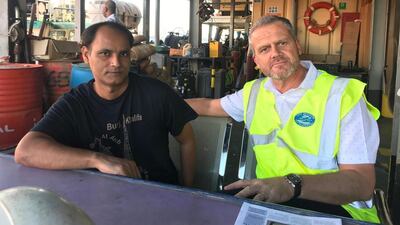Anxiety and depression among seafarers soared during the coronavirus pandemic with many trapped on board vessels unable to return home, a maritime safety conference heard.
Industry experts discussed what measures could be taken to improve seafarer welfare after mental health cases fuelled by months of isolation were widely reported.
The United Nations has called all governments to assign seafarers “key worker status” during the pandemic to offer them greater protection.
An Institution of Occupational Safety and Health report found an increase in anxiety and depression in seafarers since the outbreak began, with some prone to emotional exhaustion and burnout.
The results were discussed at the second Tristar Safety at Sea conference, which was held online.
“We are seeing depression and anxiety increasing with at least one seafarer experiencing this on board every vessel at sea,” said Casper Meland, maritime lawyer and chief executive of Marine Benefits, insurers with more than 100,000 members.
“Depression on board a ship is radically different than on land, with different consequences.
“The likelihood of other illnesses and accidents will increase dramatically.”
The Refresh wellbeing survey conducted by Marine Benefits found 19 per cent of members felt some degree of anxiety while on board.
Of those participating, 47 per cent felt they did not have a co-worker they could confide in, while 4 per cent felt discriminated and 5 per cent bullied.
A further 10 per cent said they were lonely on board ships.
Seafarer experiences during the pandemic found 72 per cent experienced a delay in crew change, with 69 per cent stating their delay was up to four months.
A further 5 per cent of crew said they were facing delays to coming ashore of 8-10 months.
The survey found 20-30 year-olds were most vulnerable to anxiety and depression, with 30 per cent feeling unsafe during emergency situations.
Dr Syed Ahmed, health manager at UK Downstream Mediterranean & Stasco, developed the health and well-being strategy for Shell employees.
He said physical and mental health at sea were intrinsically linked, but were often ignored by shipping companies.
“We don’t really understand the link between physical and mental health within the industry,” he said.
“If we pay attention to these things, we will thrive.
“It is awkward to talk about mental health on board vessels, but it is so important.”
Although mental welfare is identified by maritime charities, protection and indemnity insurers, employers do not recognise its importance to the same extent, experts said.
Isolation, loneliness, lack of shore leave, fear of criminalisation, job loss and family separation all predispose seafarers to mental health issues.
While some employers adopted a wide-ranging approach to mental well-being onboard vessels by improving conditions and internet access, 55 per cent of employers in the past decade had made no policy changes to address mental health.
The IOSH report found family related problems were the main cause of most seafarers feeling depressed.
The issue of abandonment of vessels by ship owners who run into financial difficulty had also increased during the pandemic, the conference heard.
As marine traffic was disrupted due to travel restrictions, some companies were unable to pay staff.
As a result of Covid-19-related travel restrictions, hundreds of thousands of seafarers were stranded on board their ships around the world, unable to return home, while others were banned from joining ships.
The enormity of the seafarers’ problem was described by the UN Secretary General Antonio Guterres as "a humanitarian and safety crisis".
On December 8, the International Labour Organisation governing body called for urgent action on the seafarer crisis relating to Covid-19.

It took the exceptional action of adopting a resolution to address the situation of seafarers trapped at sea.
“We need to ensure that beyond Covid, seafarers are seen as a priority as key workers,” said Andy Bowerman, the Mission to Seafarers chaplain who leads Gulf operations from Dubai.
“When it comes to managing their medical needs during the pandemic we have negotiated with the Federal Transport Authority to supply medical personnel who we can take with us to vessels at anchor.
“With special short-term permission, they can come into port to treat seafarers who have specific needs.
“It should not just go back to denying access and permission for the heath treatment they need once the pandemic is over.
“There is an opportunity in the UAE to see them as key workers and respond to their needs when they present them.”








